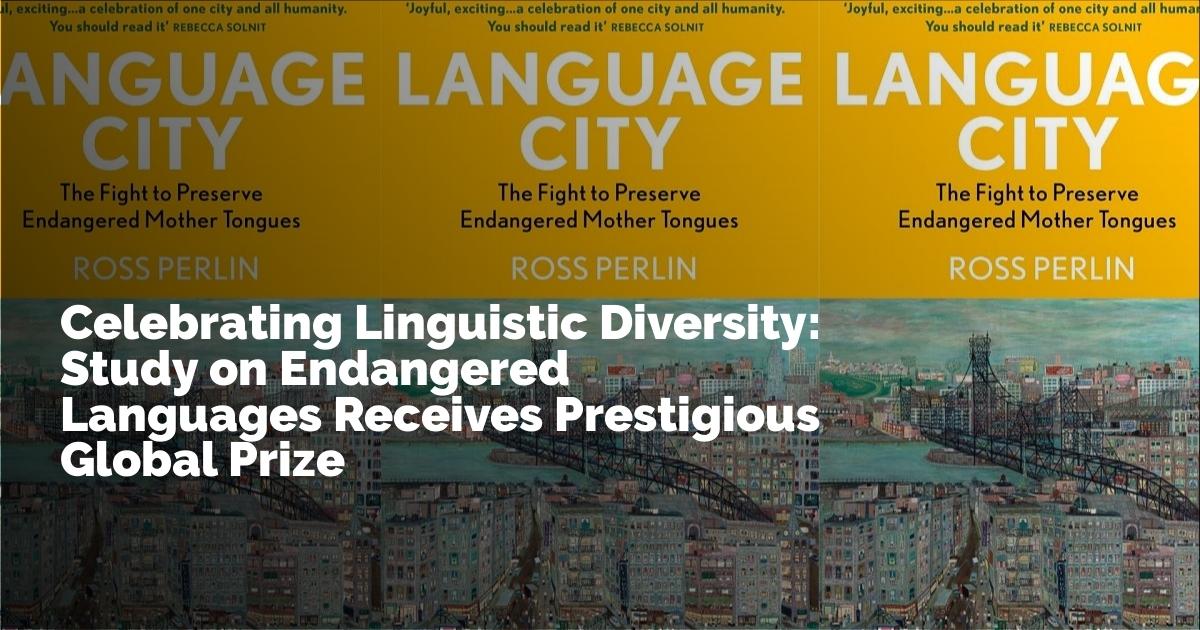Endangered Languages: A Tale of Cultural Resilience and Recognition
In a linguistic tapestry as vibrant and complex as New York City's soundscape, Ross Perlin's book, "Language City: The Fight to Preserve Endangered Mother Tongues," emerges as a vital narrative about cultural perseverance and the crucial role that endangered languages play in our global society. In a world increasingly dominated by a few major languages, Perlin's work stands as a beacon for the preservation of linguistic diversity, earning the prestigious British Academy Book Prize for Global Cultural Understanding.
The British Academy Book Prize: Celebrating Cultural Perspectives
Established in 2013, the British Academy Book Prize for Global Cultural Understanding annually celebrates outstanding non-fiction works that offer new insights into world's cultures. The prize, along with a monetary award of £25,000 (€30,100), acknowledges the efforts of authors like Perlin who delve into the intricate relationships between language and culture. This year, "Language City" has captivated judges and readers alike with its profound exploration of linguistic resilience, threading the history and contemporary struggles of New York's linguistic communities.
New York's Linguistic Tapestry: A Historical Overview
Perlin's book begins with the migration history into New York, illustrating how incoming cultures and languages overwhelmed the indigenous Lenape speakers. This historical narrative is not just a recount of past events but serves as a foundation for understanding today's linguistic landscape. New York City, boasting over 700 languages, is portrayed as the most linguistically diverse city in history. This diversity, a direct result of continuous waves of immigration, presents both challenges and opportunities for preserving endangered languages.
Case Studies: Voices of the Endangered
Central to "Language City" are six compelling case studies of endangered language speakers residing in New York. Through these narratives, Perlin examines how languages can persist despite the overwhelming odds against them. These stories highlight the resilience of cultural communities, revealing the unique grammar and syntax intrinsic to each language and what they unveil about their respective cultures. These narratives are not mere anecdotes; they are testimonies to the tireless efforts of individuals and groups fighting to keep their linguistic heritage alive.
Linguistic Diversity: A Call for Immediate Action
The decline in language study participation has been a growing concern, and the British Academy highlights this trend as an urgent issue needing reversal. Professor Julia Black, the Academy's president, stresses the importance of maintaining a linguistically diverse society. "Language City" underscores what is at risk if contemporary society fails to act—they risk losing invaluable cultural heritage and human connection that these languages enable. The book serves as a poignant reminder that languages, much like ecosystems, depend on diversity to thrive and contribute to a dynamic, inclusive society.
Perlin's Advocacy: Beyond the Written Word
Ross Perlin, a linguist and writer, is deeply embedded in the world of language preservation. Describing his home as "Lenapehoking," he pays homage to the Lenape people, historically associated with the land extending from Connecticut to Delaware. Beyond his achievements as an author, Perlin plays a vital role as co-director of the Endangered Language Alliance, where he oversees projects aimed at language documentation, mapping, policy, and public programming. His dedication is not confined to academic research but extends to practical efforts to engage communities and policymakers in preserving linguistic heritage.
Celebrating Literary Achievement: Other Noteworthy Works
While Perlin's "Language City" secures the top prize, the British Academy's shortlist highlights other remarkable contributions to cultural understanding. Ranging from Ed Conway's "Material World" to Annabel Sowemimo's exploration of racism in "Divided: Racism, Medicine and Why We Need to Decolonise Healthcare," these works collectively emphasize the diverse approaches authors take to explore historical and societal narratives. Through different lenses, each book enriches our comprehension of the world's multifaceted cultural and intellectual landscape.
A Legacy of Recognition and Reflection
The British Academy Book Prize for Global Cultural Understanding continues to honor works that challenge conventions and expand our global perspectives. Last year, the prize was awarded to Nandini Das for "Courting India," a book that revisited Britain's historical ties with Mughal India. Each year, the prize not only champions individual achievements but also fosters a broader dialogue on how culture shapes human experience.
In Perlin's narrative, the prize recognizes the urgent need to preserve endangered languages and the cultural wealth they represent. As "Language City" opens our eyes to the rich, interconnected narratives of linguistic communities, it becomes clear that Perlin's work is not just about preserving words—it's a call to protect the very fabric of human history and identity.
출처 : Original Source

